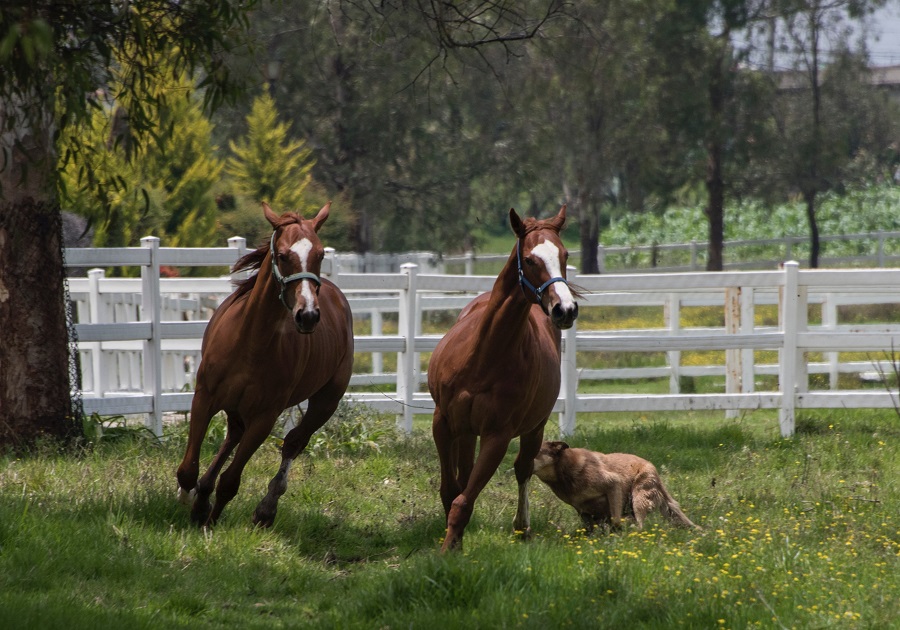Tuesdays with Tony
Rabies
This week I’m starting with the condensed version of things. Rabies can look like just about anything neurologic, from a little bit quiet, to raging maniac. It can also look like a wound that won’t heal, and is super itchy. Oh, and it can also look like a mild colic that doesn’t respond to Banamine. Even better, you can get Rabies from your horse. The answer? VACCINATE your horse for Rabies. And your dog, and cat, too! And now, the rest of the story.
If you’re a mammal, you can get it
Rabies is an interesting virus. Lots of them are, but Rabies is really good at getting itself passed around. To start with, it only infects mammals, but it does a pretty good job being able to infect all of them. From rats, to foxes, to dogs, cats, and elephants, they all have the potential to get Rabies. Once an animal is infected, it usually takes between three and eight weeks to show symptoms. BUT, and it’s a huge but, it can take a really, really long time for symptoms to show up, like months, and in rare cases, years. Rabies has to travel from the point of entry to the brain before it starts wreaking havoc, and the immune system is fighting it the entire way. This means if an animal gets infected by a bite at the tip of its tail, it’s going to be a long time before it makes it to the brain. Know what keeps it from getting to the brain? A vaccinated animal! Know who makes sure your horse gets all the right vaccines at the right time? My Docs!
Rabies in Da House!
I’m not gonna lie, I find it fascinating what teanie, tiny viruses can do to make sure they live, and reproduce. Now that the Rabies virus has made it to the brain, it’s going to change the behavior of the animal to increase the chances it gets passed around. How crazy is that?!? I mean, I’ve changed the behavior of my humans so it’s more to my liking, but I’m a wickedly intelligent cat. This is a virus. You can’t even see it with a microscope. While signs of rabies can start out pretty varied, almost all infected animals will go through these next phases at some point. The virus will make them start drooling. This is brilliant because the virus is concentrated in the saliva. What better way to spread yourself than make more drool?

Next, the virus makes the animal lose its fear. This means that wild fox is faster to come up to you and act tame. Or, if no humans are around, go after a horse like you see in this video https://www.facebook.com/TCEESFL/videos/1985117155060876/ The fear of water thing is a bit of a myth, but nearly all of them will get aggressive at some point. Which makes sense. This aggression drives them to attack and bite other animals, and then the virus gets to live another day, in another animal. Know what prevents this? A properly vaccinated animal.
What’s with the crazy quarantines?
Because rabies can be given to humans, the Health Department takes quarantine and testing very, very seriously. My Docs recommend calling your local Health Department if you have an animal you think may have rabies.They will work with animal control, and/or local veterinarians to capture and test the suspicious animal. They will then quarantine your animals, and your property for the safety of everyone else. You don’t want to be the one responsible for spreading rabies to everyone in your neighborhood, do you? Pretty sure that would get you unfriended in real life as well as the Face thingy.
If your animals are vaccinated by a veterinarian, that quarantine will only be 10 days. I know none of you would vaccinate your animals any other way, because you know your veterinarian is the best way to make sure the vaccines are handled and administered properly, but we all have weird friends and relatives. If you vaccinated your animals, or, even worse, if they aren’t vaccinated at all, that quarantine could be as long as 6 months, because of the potentially long incubation time I talked about earlier. Seems like cheap protection to have your veterinarian properly vaccinate your horse.
Speaking of Vaccines
I hear this one all the time: my dog and cat get vaccinated for rabies every three years. How come my horse gets it every year? Because your horse is really bad at responding to the vaccine, that’s why. Horses are really bad at the important things like digestion, good support structure, and responding to vaccines. Extensive research shows that horses are protected by the vaccine for 14-16 months. That’s not a spectacular response time. And that’s why your horse should get one every 12 months. Rabies vaccines are also only recognized by the powers that be when administered by a veterinarian. Again, I know you would never administer your own vaccines, but there’s the weird friends and family to think about.
Back to where I started. Make sure your horse is vaccinated for rabies yearly, and report weird wildlife behavior.
Now be a well-behaved, non-rabid human and scroll down to the subscribe button. If you subscribe, you get my blog a day early, and you never miss my wisdom and charm.
Until next week,
~Tony
Tuesdays with Tony is the official blog of Tony the Clinic Cat at Springhill Equine Veterinary Clinic in Newberry, Florida. If you liked this blog, please subscribe below, and share it with your friends on social media! For more information, please call us at (352) 472-1620, visit our website at SpringhillEquine.com, or follow us on Facebook!

You must be logged in to post a comment.